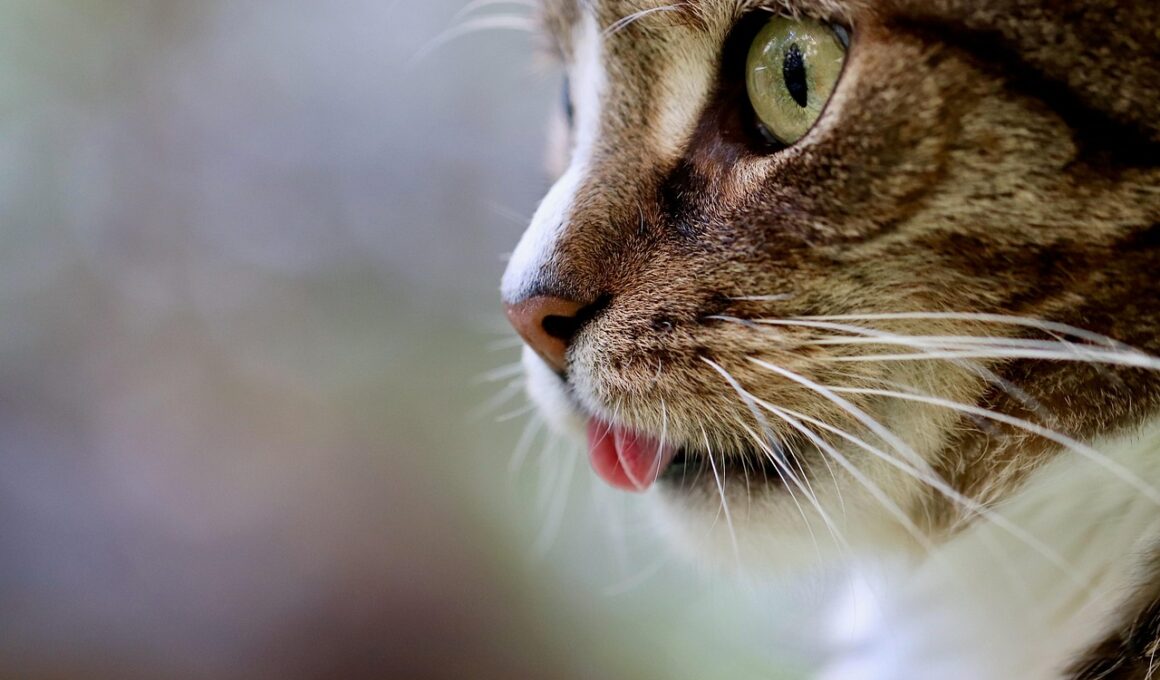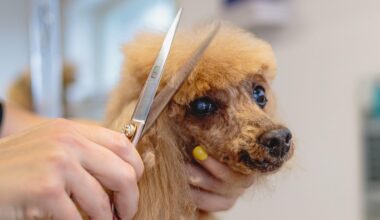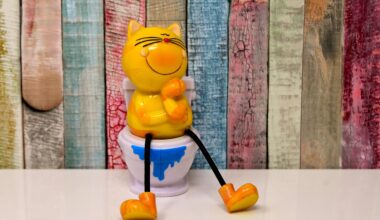Socialization Challenges in Senior Cats with Health Issues
Senior cats face numerous socialization challenges, especially if they have pre-existing health issues. Changes in their behavior may be noticeable, causing stress for both the cat and its owner. Physical ailments can lead to discomfort, resulting in reduced interaction with other pets and humans. Senior cats may become less active, preferring solitude over playtime. This tendency can discourage bonding, essential for a pet’s emotional wellbeing. It’s crucial to monitor the signs of social discomfort in your elderly feline. For example, observe their body language closely. A tucked tail or flattened ears may indicate distress. Engage gently and patiently to rebuild trust. Additionally, understanding the impact of health conditions on your cat’s social behavior can help you devise better interaction strategies. Access to quiet, safe spaces where the cat can retreat is essential. Providing enriching toys may enhance their mood and tempt them to engage. Consulting with your veterinarian is advisable to identify specific problems hindering socialization. Together, you can create a tailored approach that accommodates your cat’s needs. Always respect their boundaries to nurture a loving and safe environment, promoting positive experiences and connections.
The importance of an enriching environment cannot be overstated when addressing socialization challenges. Senior cats often experience increased anxiety, worsened by health issues and reduced mobility. Thus, it’s essential to create a stimulating environment tailored for them. Enrichment can come in various forms, helping to maintain their mental health and encourage social interaction. One effective approach is to introduce interactive toys designed for senior cats. These toys promote problem-solving and can rejuvenate aging minds. Providing scratching posts at various heights allows them to stretch comfortably and fulfill their instinctual needs. Consider incorporating soft bedding in cozy spots, enabling your cat to feel secure. Additionally, regular gentle playtime encouraged by the owner can help forge connections that mitigate isolation. It’s also vital to establish a predictable routine that can comfort a senior cat. Routine instills a sense of security, making social interactions more manageable. You may also explore the possibility of adopting another calm, gentle pet. A well-matched companion can facilitate socialization—a gradual introduction is essential. Always be patient and allow your senior cat to set the pace for interactions to ensure they feel comfortable and loved.
Feeding and Social Interaction
Feeding times present excellent opportunities for socialization, particularly for senior cats with health challenges. By creating positive associations around food, owners can encourage their cat to engage more actively. Offering meals at the same time daily fosters a routine that can be comforting. If feasible, try hand-feeding treats to promote closeness during feeding sessions. Treats can help reward engagement and motivate them to participate in social encounters with you and other pets. Additionally, consider using interactive feeding toys that allow the cat to work for their food, stimulating both their mind and body. Over time, such activities can strengthen your bond and promote their interest in socialization. It’s important to monitor their eating habits closely, especially if health conditions affect appetite or digestion. Offering smaller, frequent meals might be more appealing for senior cats dealing with these challenges. Additionally, using high-quality foods designed for senior cats can improve their overall wellbeing. Always consult your veterinarian for recommendations tailored to your cat’s specific dietary goals. Nourishing their bodies properly will provide ample energy to engage more comfortably in socialization, fostering an even stronger connection with you and the surrounding environment.
Another factor that influences socialization in senior cats is their health condition. Understanding various health issues can pave the way for better social interactions. Common conditions affecting older felines include arthritis, dental disease, and diminished vision or hearing. Each of these ailments can impact their willingness to socialize with others. For instance, a cat suffering from arthritis may avoid playing due to pain. Consequently, you might notice them retreating during interactions or becoming less interested in shared play sessions. Adjusting expectations and being mindful of their limitations can significantly aid socialization attempts. Regular veterinary check-ups are vital to address underlying medical issues promptly, providing opportunities to optimize their comfort and engagement. As health issues are treated or managed, senior cats may show improvements in their interactions, requiring patience and a tailored approach. Additionally, if your cat loses one of its senses, providing alternative cues, such as sound or scent, can help in bridging the gap effectively. Ensure that your cat’s environment is structured to facilitate their needs, allowing for easier navigation. Ultimately, being observant and adaptive is crucial in helping them re-establish connections with their family or the environment surrounding them.
Establishing a Safe Social Space
Establishing a safe social space is essential when facing socialization challenges with senior cats experiencing health issues. Senior cats often prefer calmer, less chaotic environments, where they can feel secure. A designated area can help your cat relax, free from excessive noise and activity, which could contribute to anxiety. You may consider utilizing a quiet room with familiar bedding, toys, and climbing furniture. Incorporating structures at varying heights promotes physical engagement and stimulates exploration without overwhelming them. Ensure this space has access to natural light and positioned near quiet activities, allowing the cat to observe while remaining undisturbed. Observational opportunities can boost their confidence gradually. Regular routines enhance predictability, enabling your cat to feel secure and easing the transition to engaging with their surroundings. Also, introduce gentle interactions gradually, allowing your cat to feel comfortable accompanying you or meeting visitors. If you have other pets, manage introductions carefully to ensure a harmonious interaction. By promoting calmness and minimizing stress triggers, your senior cat can develop a better sense of security, ultimately encouraging them to engage with you and enrich their social experiences.
It’s essential to recognize the importance of patience when addressing socialization challenges amongst senior cats with health issues. Building a relationship based on trust may take time, especially if your feline companion has experienced trauma or harbors fears. Allowing them to approach interactions at their own pace can produce better long-term results. Providing positive reinforcement through treats, praise, or affection when they demonstrate social behaviors helps in fostering their confidence. Gradually, they may become more comfortable with social situations, as each successful interaction reinforces their positive experiences. It is also important to remember that every cat is unique, and you should adjust your approach based on their personality and health state. Consider reflecting on their past experiences might help inform your methods and expectations. Establishing routines that prioritize gradual interactions can reinforce social behavior while accommodating their capabilities. Continuously observing their behavior and learning from their cues is vital. Only indulge in interaction strategies that they respond positively to, as this will help solidify the bond. All in all, patience and understanding are key in promoting socialization, ultimately benefiting both you and your senior feline.
Conclusion: Loving Care Above All
In conclusion, providing loving care for a senior cat facing health issues demands a thoughtful approach to socialization. Recognizing their specific needs and limitations is pivotal for successful social interaction. Creating a safe, enriching environment tailored to their comfort will undeniably contribute to improvements in social behavior. Initiatives such as gentle play, establishing routines, and promoting positive feeding experiences play crucial roles in fostering engagement. Additionally, maintaining open communication with your veterinarian ensures that any health problems are addressed timely and effectively, allowing your feline friend to feel at ease. Understanding their unique challenges will enable you to establish trust, paving the way to deeper connections with both you and other pets. At times, it may feel overwhelming, but approaching your senior cat’s socialization challenges with empathy and support will yield rewarding results. As their caregiver, your presence and positive assurance become fundamental in nurturing their ability to engage. Slowly but surely, your dedicated efforts will culminate in a fulfilling companionship that makes the golden years of your feline as enriching as possible. Ultimately, remember that love and compassion create the best environment to help them thrive.


